人教版B8 Unit 4 Pygmalion Reading课件71张
文档属性
| 名称 | 人教版B8 Unit 4 Pygmalion Reading课件71张 | 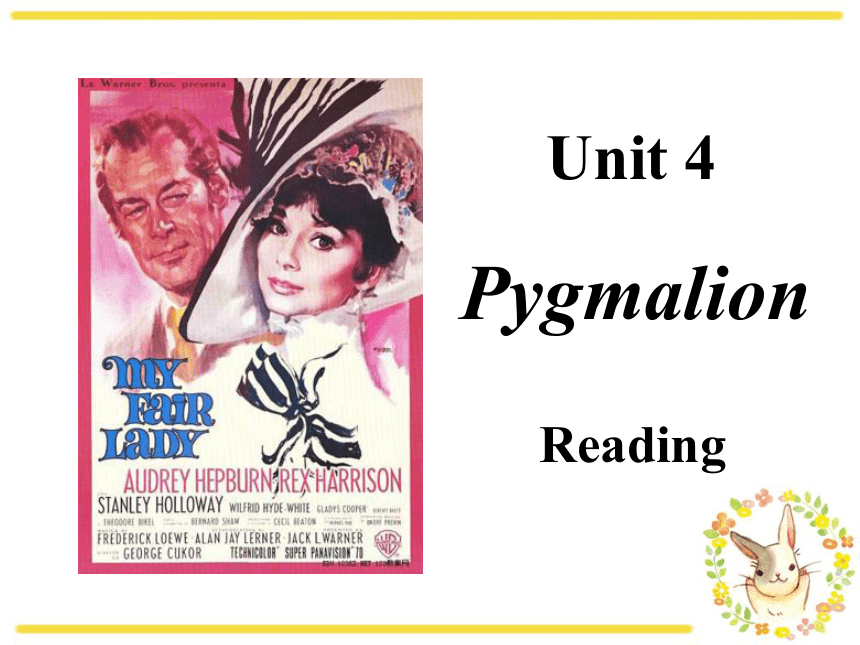 | |
| 格式 | zip | ||
| 文件大小 | 6.4MB | ||
| 资源类型 | 教案 | ||
| 版本资源 | 人教版(新课程标准) | ||
| 科目 | 英语 | ||
| 更新时间 | 2015-05-26 16:43:30 | ||
图片预览

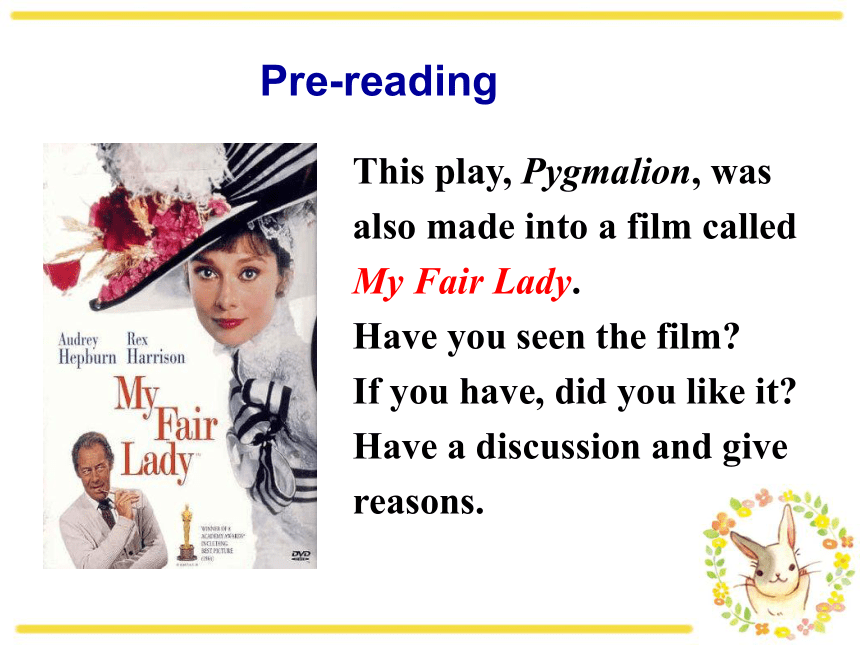
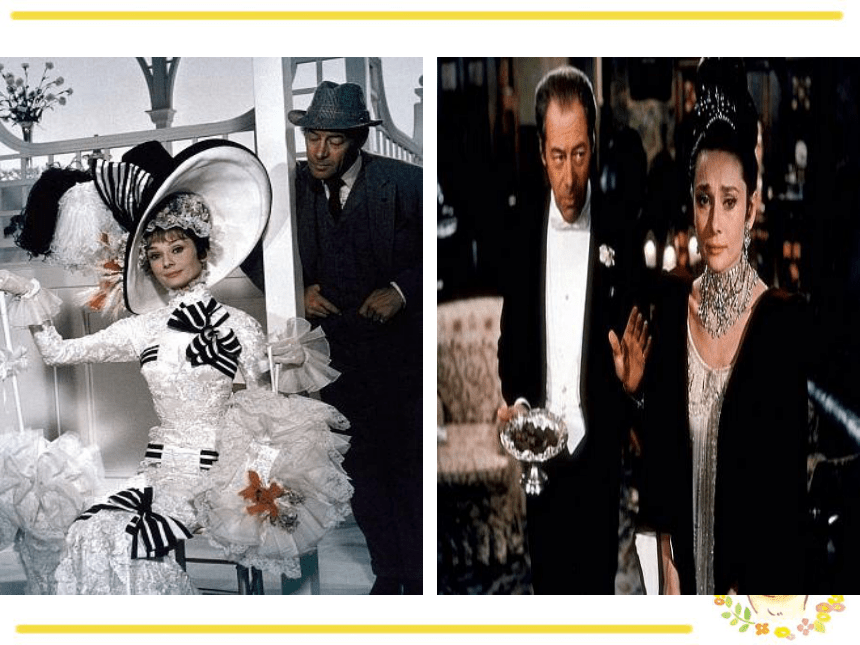

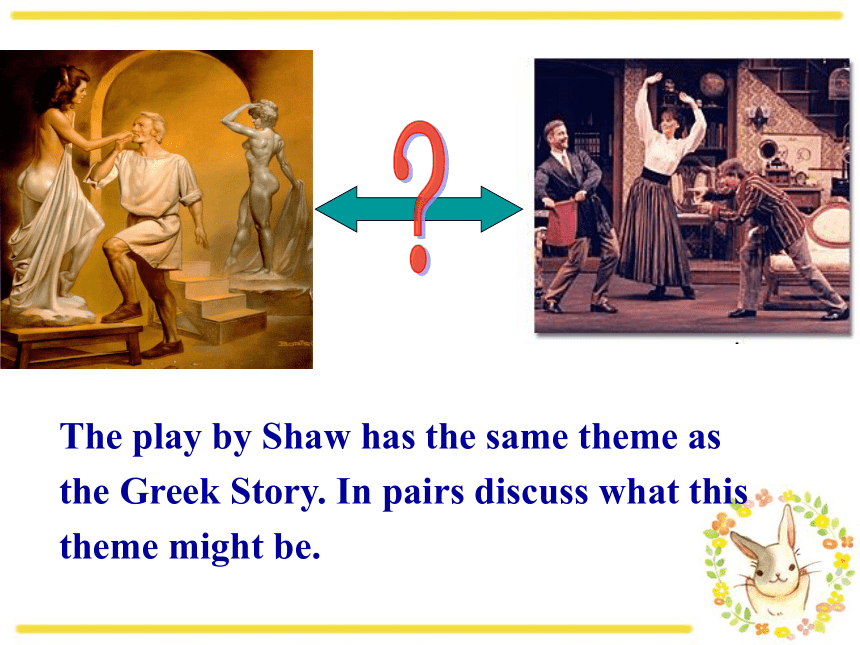

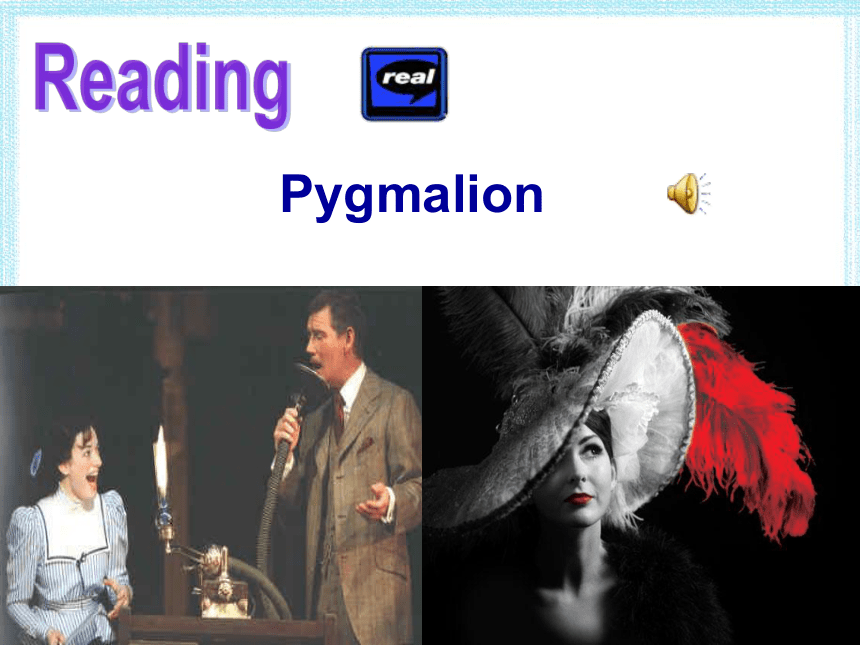
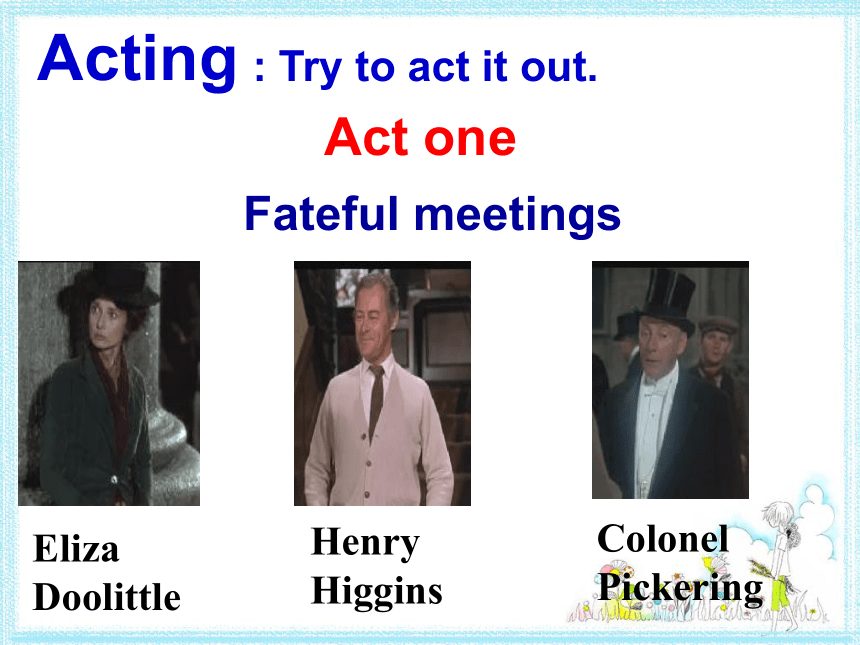

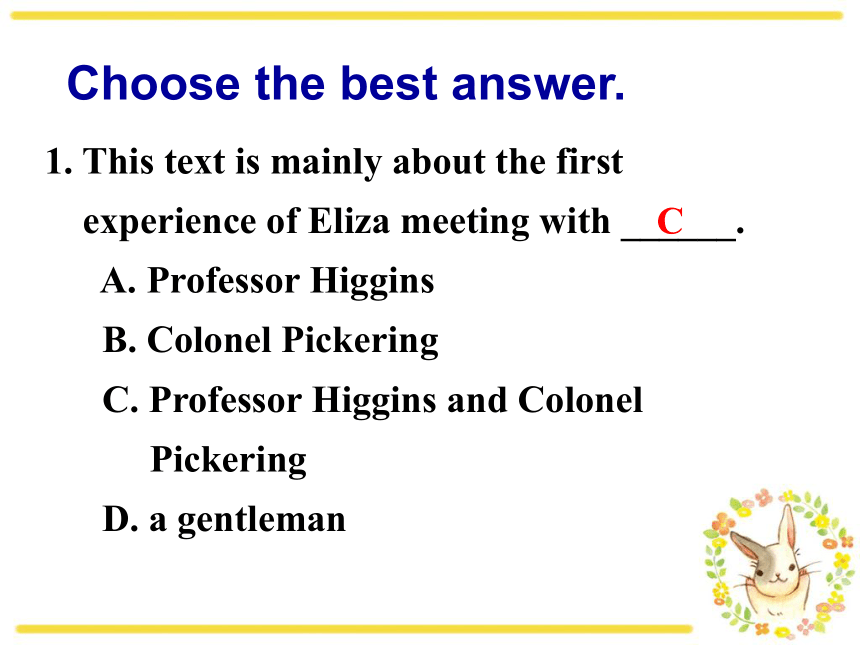
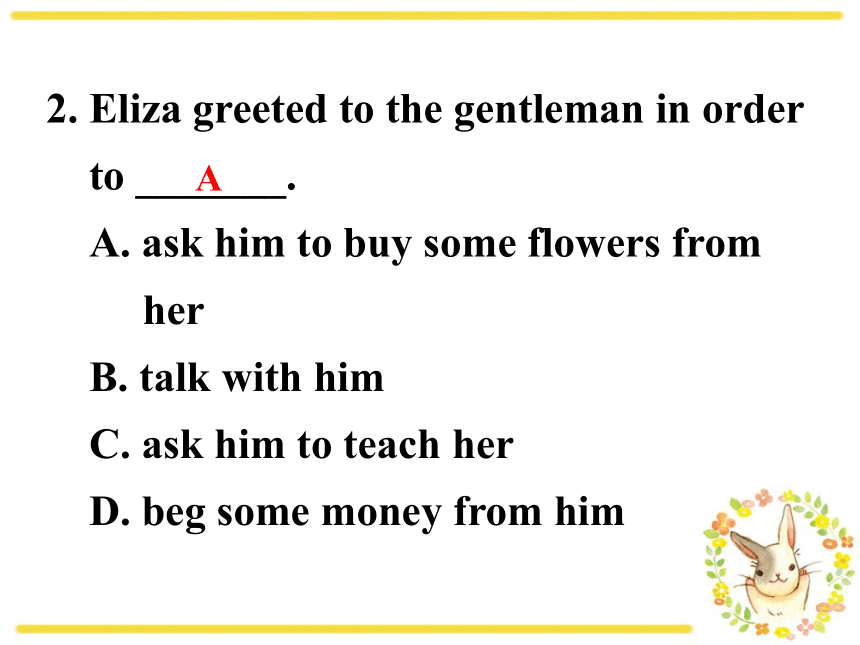
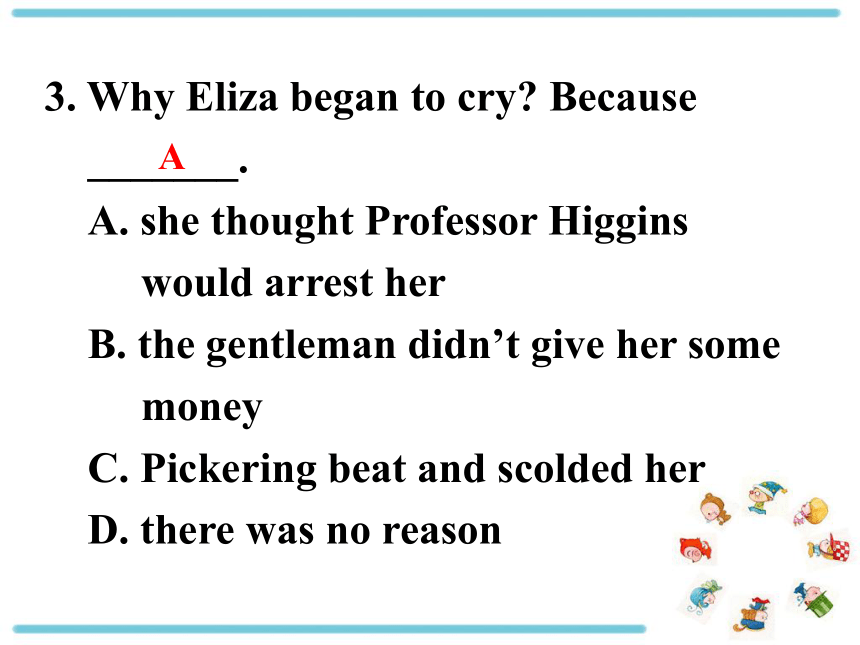
文档简介
课件71张PPT。Unit 4PygmalionReadingThis play, Pygmalion, was
also made into a film called
My Fair Lady.
Have you seen the film?
If you have, did you like it?
Have a discussion and give
reasons.Pre-reading?The play by Shaw has the same theme as
the Greek Story. In pairs discuss what this
theme might be.Theme of the Greek story: Pygmalion, an artist
create a statue from stone and make it have a
new life .
Theme of My fair lady: Higgins, a phonetics
create a new girl Eliza from lower class to upper
class by teaching her English.PygmalionReadingActingAct oneFateful meetings: Try to act it out.Eliza DoolittleHenry
HigginsColonel
PickeringMain charactersEliza Doolittle(E): a poor flower girl who is
ambitious to improve herself.
Professor Higgins(H): an expert in phonetics,
convinced that the quality of a person’s English
decides his/her position in society.
Colonel Pickering(P): an officer in the army
and later a friend of Higgins’ who sets him a task.1. This text is mainly about the first
experience of Eliza meeting with ______.
A. Professor Higgins
B. Colonel Pickering
C. Professor Higgins and Colonel
Pickering
D. a gentlemanC Choose the best answer. 2. Eliza greeted to the gentleman in order
to _______.
A. ask him to buy some flowers from
her
B. talk with him
C. ask him to teach her
D. beg some money from himA 3. Why Eliza began to cry? Because
_______.
A. she thought Professor Higgins
would arrest her
B. the gentleman didn’t give her some
money
C. Pickering beat and scolded her
D. there was no reasonA 4. Professor Higgins believed that he
could judge a person by _______.
A. his appearance
B. his action
C. his conversation
D. his mannersC 5. From the text, we can infer that
Professor Higgins is a man described
below EXCEPT _________.
A. he doesn’t care about money
B. he is an expert in phonetics
C. he is proud
D. he is greedyD Lower classLanguage: calls gentleman “sir” and _________ (or captain) which is a complimentBehaviour: _________ to people of higher classrespectful“cap’in”Fill in the chart. Language: calls Eliza “___________” and Pickering “____________”Behaviour: _____ to lower class; _____ to same or upper classMiddle classrudepoliteyou silly girlmy dear manUpper classLanguage: prepared to begin a __________ with Henry, whom he does not know; generous with praise to himBehaviour: generally confident and ______; but _______ Elizapoliteignoresconversation1. Eliza was selling some flowers when
Higgins first met her.
2. She succeeded in selling some dead
flowers to Huggins for some small change.
3. Huggins wrote down her name and
address.
4. Huggins was good at judging people
from their own speech.T F F T True or False? 5. Huggins could earn a lot for his job.
6. Huggins promised to find her a good
job.
7. Either man had planned to meet the
other although they didn’t know each
other.T F T Read Act One of the play and then
answer these questions. Comprehending 1. What is the name of the man hiding
from the rain? Henry Higgins2. Why is Eliza frightened of him at first?
3. Where has Colonel Pickering been living
and what has he studied? She thinks he is a policeman in disguise.He has been living in India and has
studied many Indian dialects.4. Who is Henry Higgins anxious to meet
and why?He is anxious to meet Colonel Pickering
because he is researching in the same
academic field as Pickering.5. What is Eliza’s ambition and what does
she decide to do about it? Her ambition is to be a shop assistant.
She decides to take lessons from Professor
Higgins to achieve her aim.6. Can you recognize each character’s
social position by their behaviour and
language? Is he or she from the upper
class, middle class or lower class?
Give your reasons. The social position of each character
influences the way they behave to
each other. Generally speaking, people
are more polite to those who they think
are of a higher social class (H) and less
polite to those they consider are
members of a lower class (L). Is this
true of the characters in Shaw’s play?
Give your evidence in the chart below. professionalphoneticiannotessilly girlYesYesexpertisepraisesYesYesignoresstopfeels upsetYesUnclearanxiouseagerambitiousrespectful3 What other things show one’s status in
Society apart from how one speaks?You can show your social status by:
Clothes you wear
Expensive possessions (like cars or jewellery)
Attitudes and behavior
Education level
How many foreign language spoken and countries visitedChoose those adjectives in the list which
best describe each character in the play.
In pairs discuss them and then place them
in the boxes below. Some can be used more
than once. impatient kind polite rude confident
anxious eager enthusiastic motional
self-important ambitious generous
unsure superior dynamic kind, polite, generous,
enthusiastic, eager, confident impatient, rude, confident,
superior, self-importantanxious, eager, emotional,
ambitious, unsure, dynamic5 Suppose you have a chance to help
Eliza improve her use of the English
language. Correct all these sentences
in terms of grammar, spelling, etc, so
that she can use them properly. 1. Come over’ere, cap’in, and buy me flowers
off a poor girl.Come over here, captain, and buy some
flowers from a poor girl.2. I ain’t done nothing wrong by speaking to
that gentleman.I haven’t done anything wrong by
speaking to that gentleman.I thought maybe you were a policeman in disguise.4. How do I know whether’ ou took down right?How do I know whether you wrote down
what I said accurately?5. A shop assistant? Now that’s sommat I want,
that is!A shop assistant? Now that’s something I
would like to be!3. I thought maybe you was a policeman in disguise.Professor Higgins (H): an expert in phonetics,
convinced that the quality of a person’s English
decides his/her position in society.
希金斯教授是一位语音学专家, 他认为一个人的
英语水平决定这个人的社会地位。1) convinced vt. to cause to believer or feel
certain; to persuade 说服; 使相信, 说动某人我们说服了他坐火车去, 不要搭飞机去。We convinced him to go by train rather plane.Language points 2) (be) convinced + of 短语/ that 从句
“坚信…”;“确信…”。例如:
我确信他有罪。
3) convince (vt.) sb + of 短语/that 从句,
“使…坚信…”; “使…确信…”。I am convinced of his guilt.=I am convinced that he was guilty.我不认为她的强作欢颜能使她父亲相信她在
那个小孤岛上过得开心。I don’t think her forced smile
________________________________________
on that small lonely is land.will convince her father that she lives happily2. While watching, he makes notes.
他一边观察, 一边做笔记。
▲ while watching 为while he was watching 省略句。在以when, while, if, unless等引导的状语从句中,如果从句中的主语与主句主语一致且从句谓语动词含有be动词的形式,往往将从句中的主语及be动词省略,而以动词的-ing形式或过去分词形式来代替。① After finishing the work, he went home. 完成工作后他就回家了。
② After being discussed, the plan should be carried out at once. 计划讨论后, 应立即实施。
③ While crossing the street, look out for cars passing by. 过马路时, 小心过路车辆。1) When_____ help, one often says “Thank you.”
or “It’s kind of you.”
A. offering B. to offer
C. to be offered80 D. offered
2) While______ the river, he saw a big crocodile.
A. to cross B. crossing C. cross D. crossed
3) Before______ , the play must be examined by
the director.
A. putting on B. to be put on
C. put on D. being put onD B D 4) Never_____ faith in himself, the scientist
went on with his research.
A. losing B. to lose
C. lost D. to be lost
5) --What’s the matter with you?
--_____ the window, my finger was cut
unexpectedly.
A. Cleaning
B. To clean
C. While cleaning
D. While I was cleaningA D 3. hesitate v. 犹豫, 踌躇
hesitate to do sth. 对做某事犹豫不决
hesitate about doing sth. 对做某事犹豫不决
I always hesitate _____ advising my friends
on what to read.
A. with B. to C. for D. about
If you have any questions, don’t hesitate ____
me.
A. ask B. asked C. to ask D. asking D C 4. hold up 1) raise; keep up 举起
Hold up your right hand.
2) show as an example 提出(作为榜样)
The teacher always holds up Tom as a model
of hard work.
3) to delay 阻滞
The building of the new road has held up by
bad weather.
短语: hold back 使固定; 阻挡 hold down 压制
hold to 遵循; 坚持 hold together 使团结;
连接在一起5. I ain’t done nothing wrong by speaking to
that gentleman.
我跟那位先生说话, 又没做什么坏事呀。
▲ ain’t 是不规范的语言, 相当于am not,
is not, has not, have not。
① We ain’t coming. 我们不来了。
② They ain’t got it. 他们没有那玩意儿。6. in disguise 意为“乔装”
我以为你是便衣警察。
I thought maybe __________________________
这位皇帝喜欢微服私访。
联想: in need of 意思是“需要”。
他需要理发了。
in need 意思是“在困难(穷困)中”。例如:
我们应该帮助贫困的人。
you was a policeman in disguise.He is in need of a haircut. The emperor liked travelling in disguise.We should help those in need. 7. Here you are (hands over the paper
covered with writing).
给你(他把写满字的纸递过来)
▲ hand over 移交; 让与; 交给某人照料
① The captain was unwilling to hand
over the command of his ship.
船长不愿移交军舰的指挥权。② The thief was handed over to the policeman. 小偷被交给警察处理。
hand down 传给
hand on 传递
hands up 举手
hand out 分给, 分发8. mistaken adj. 错误的, 不正确的
If I’m not mistaken, we must have met before.
be mistaken about 对…持错误的见解
mistake n./v. 错误; 犯错误
make a mistake
mistake A for B 把A错当成B
9. What if I was? 如果我是又怎样呢?
此句为省略句。原句为:
What if I was born in…?
What if…意思为“要是……又会怎样?”10. classify v. 编排; 分类; 归类
be classified by/according to 通过…归类
be classified as 被归类为
classify sth in / into 把某物分成
In the library, books are usually classified
by subjects.11. People begin their working life in a poor
neighbor of London with 80 pounds a year
and end in a rich one with 100 thousand.
人们在伦敦的一个贫穷地区开始工作, 年薪
80英镑, 而最终成为拥有10万英镑的富人。
此句为并列句, 主句为 people begin…and
end in…; in a poor…with, in a rich.. with 在
句中作状语。12. But they betray themselves every time they
open their mouths.
但每次一张嘴说话,他们就原形毕露。betray oneself 无意中露出本性; 背叛相当多的人面对金钱的诱惑便原形毕露。
_____________________________________
When tempted by money.Quite a lot of people will betray themselvesbetray 1) vt. give away or make known
泄露(秘密)
他向所有的朋友透露了这个消息。
__________________________________He betrayed the news to all his friends.2) vt. to be disloyal or unfaithful to 出卖; 背叛他的最好的朋友背叛了他。
___________________________His best friend betrayed him.他背叛祖国,向敌人投降了。
_________________________________.He betrayed his country to the enemy3) to be a sign of (sth. One would like to hide)
显露; 显示
他的脸显露出他很生气。
_________________________________
betray + n. + to 出卖, 背叛
betray +n.+ (to be)/-that “无意中显示, 暴露”
名词形式betrayal, 如: an act of betrayal
背叛的行为His face betrayed that he was angry.13. Now once taught by me… 一旦由我来教, …
When finished, the homework was handed in.
作业一完成就交上了去。
以once, if, as, unless, when, though, although
引导的状语从句, 若从句主语与主句主语一致,
且从句中谓语动词为 be+v.-ed 形式, 或从句中
主谓结构为it is (was)+ adj.时, 则从句结构可以
直接由以上连词加v-ed或adj.代替。14. condemn vt. 谴责
1) condemn sb. / sth. 谴责某人/某事
大部分人谴责任何形式的暴力行为。
_____________________________________.
2) be condemned to death / be sentenced to
death 被判死刑
那个罪犯被判处死刑。
__________________________________
3) condemn sb. to do sth. 判处某人服…刑
他的病使他被迫一直呆在床上。
_______________________________________ Most people condemn any sort of violence.The criminal was condemned to death.His illness condemned him to be in bed all the time.15. But, sir, (proudly) once educated to speak
properly, the girl could pass herself off in three
months as a duchess at an ambassador’s garden
party. 可是, 先生(自豪地), 一旦那个女孩被教会
说正确的英语, 她就能够在三个月后由一位大使
举办的舞会上冒充一位女公爵。
这是一个复合句, 从句为once she is educated to
speak properly 的省略形式。pass …off as 冒充她冒充自己是位有经验的演员。
_______________________________________She passed herself as an experienced actress.pass off 逐渐消失; 不加理会; (进展)顺利你的牙疼还没消吗?
Has your toothache passed off yet?
他回避了那个难问题。
He passed off the difficult question.
舞会进展顺利。The party passed off well.pass away 去世
pass down/on 把……传给后世
pass out 昏过去; 失去知觉
pass …on to 把…传递给
pass through 通过; 穿过
pass by 走过; 不理会
我很久以前已经认识他了。我懂得这门语言。16. acquaintance n. 相识; 了解 acquaint vt.I have some acquaintance with the language.I made his acquaintance long ago.使某人了解make one’s acquaintance /
make the acquaintance of sb.结识某人be familiar with/be acquainted with对…熟悉acquaint sb. withhave a nodding acquaintance with sb.
与某人为点头之交
The musician had little acquaintance
_____ modern science.
A. in B. with C. to D. of
I am delighted to _____ your acquaintance.
A. pull B. take C. have D. make
B D 17. a handful of 一把, 少数的(人)
我给了那个男孩一把糖。
我们邀请了12人, 但只有几个人来。
I gave the boy a handful of sweets.We invited 12, but only a handful of them came.a basketful
a bagful of
a mouthful of
a pocketful of一篮子一书包一口一袋18. a fortune! 一笔财富
[U] success; good luck 成功; 好运, 幸运
Fortune smiled on him. 他事事顺利.
By good fortune he was not hurt.
2) [C] 未来的命运; 运道; 运气
What will be our fortune?
One day good fortune befell him.
3) [C] 财富
He received a large fortune when his father died.
fortunate adj. 幸运的 fortunately adv. 幸运地
make a fortune 发财 seek one’s fortune 外出找出路
try one’s fortune 碰运气
be fortunate to do sth./ in doing sth. 幸运地做某事19. Generally speaking, people are more polite to
those whom they think are of higher social class.
总的来说, 人们对那些他们认为属于较高社会阶层
的人更礼貌一些。
1) 本句中的of 表示”从属”关系。
物以类聚, 人以群分。Birds of a feather flock together.
2) be of + 形容词+抽象名词=be +副词+与该抽象
名词同根的形容词。如: 我所说的非常重要。
What I said is of great importance.
= What I said is very important.可用于以上结构的抽象名词及相对应的
形容词有: ability--able, help--helpful,
importance--important, interest--interesting,
significance--significant, use--useful,
value--valuable.20. superior 作为形容词有两大用法:
1) 作为普通形容词, 意为“傲慢的”。例如:
我讨厌他那傲慢的态度。
I hate his superior manner.
2) 作为暗含比较级的形容词, 意为“较高级”、
“较好的”、“较…为优秀的”。
由于superior本身隐含着比较意义, 因此不能
在前面再加more。在与另一事物进行比较时,
与之搭配的介词要用to, 不能than。如:
约翰逊的数学比王先生好。
Johnson is superior to Mr. Wang in mathematics.与superior用法相同的词还有inferior,
senior, junior, prior等。
比…优越, 不屈服于 be superior to
低于 be inferior to
比…年长 be senior to
比…年轻 be junior to
如: 青铜不如金子。Brass is inferior to gold.
他比我小很多岁。
He is junior to me by many years.
我母亲在结婚前曾经是电工。
Prior to her marriage, my mother was an
electrician.21. in terms of 就……来说, 从……角度 In terms of natural resources it is one of the
poorest countries in Western Europe.
In terms of money we’re quite rich, but not in
terms of happiness.
就安置房子你做了什么?
What have you done in terms of fixing the house? in the long/ short term 从长期/短期而言be ambitious to
convince sb. of sth./that/to do sth.
decide
set sb. a task
hide from the rain
shelter from the rain
make notes /take notes
hold up
better than nothing雄心勃勃的
使确信
决定/影响
安排某人任务
躲雨
作笔记
举起
比没有好Phrases in disguise
hand over
push sth back
if I’m not mistaken
what if
every time
end in
betray sb/sth/oneself
dismissively9. 假装, 装扮
10. 移交
11. 推迟延迟
12. 如果我没有搞错的话
13. 要是…又会怎样
14. 每次
15. 以…为结尾
16. 背叛, 泄露
17. 轻蔑地condemn sb. to sth.
the gutter
to the end of her days
find employment
make one’s acquaintance
a handful of
in amazement
deep in conversation
fancy oneself18. 迫使接受困境
19. 社会底层贫民窟
20. 余生
21. 找工作
22. 结识
23. 一把
24. 惊谔地
25. 专心谈话
26. 自负自命不凡quite a common kind of
badly dressed
ask sb. a favour
treat sb. like dirt
have the face to do
the other day
take away
pass sb. off as
go off stage
fade out27.相当普通的一种
28.穿着很差
29.请求帮忙
30.视…如粪土蔑视
31.恬不知耻做…
32.几天前
33.带走, 外卖
34.冒充
35.退下舞台
36.逐渐模糊HomeworkReview the text. Try to act out the play.
Write a short passage to introduce the
story briefly.
3. Find out some difficult words and
expressions in the play.
also made into a film called
My Fair Lady.
Have you seen the film?
If you have, did you like it?
Have a discussion and give
reasons.Pre-reading?The play by Shaw has the same theme as
the Greek Story. In pairs discuss what this
theme might be.Theme of the Greek story: Pygmalion, an artist
create a statue from stone and make it have a
new life .
Theme of My fair lady: Higgins, a phonetics
create a new girl Eliza from lower class to upper
class by teaching her English.PygmalionReadingActingAct oneFateful meetings: Try to act it out.Eliza DoolittleHenry
HigginsColonel
PickeringMain charactersEliza Doolittle(E): a poor flower girl who is
ambitious to improve herself.
Professor Higgins(H): an expert in phonetics,
convinced that the quality of a person’s English
decides his/her position in society.
Colonel Pickering(P): an officer in the army
and later a friend of Higgins’ who sets him a task.1. This text is mainly about the first
experience of Eliza meeting with ______.
A. Professor Higgins
B. Colonel Pickering
C. Professor Higgins and Colonel
Pickering
D. a gentlemanC Choose the best answer. 2. Eliza greeted to the gentleman in order
to _______.
A. ask him to buy some flowers from
her
B. talk with him
C. ask him to teach her
D. beg some money from himA 3. Why Eliza began to cry? Because
_______.
A. she thought Professor Higgins
would arrest her
B. the gentleman didn’t give her some
money
C. Pickering beat and scolded her
D. there was no reasonA 4. Professor Higgins believed that he
could judge a person by _______.
A. his appearance
B. his action
C. his conversation
D. his mannersC 5. From the text, we can infer that
Professor Higgins is a man described
below EXCEPT _________.
A. he doesn’t care about money
B. he is an expert in phonetics
C. he is proud
D. he is greedyD Lower classLanguage: calls gentleman “sir” and _________ (or captain) which is a complimentBehaviour: _________ to people of higher classrespectful“cap’in”Fill in the chart. Language: calls Eliza “___________” and Pickering “____________”Behaviour: _____ to lower class; _____ to same or upper classMiddle classrudepoliteyou silly girlmy dear manUpper classLanguage: prepared to begin a __________ with Henry, whom he does not know; generous with praise to himBehaviour: generally confident and ______; but _______ Elizapoliteignoresconversation1. Eliza was selling some flowers when
Higgins first met her.
2. She succeeded in selling some dead
flowers to Huggins for some small change.
3. Huggins wrote down her name and
address.
4. Huggins was good at judging people
from their own speech.T F F T True or False? 5. Huggins could earn a lot for his job.
6. Huggins promised to find her a good
job.
7. Either man had planned to meet the
other although they didn’t know each
other.T F T Read Act One of the play and then
answer these questions. Comprehending 1. What is the name of the man hiding
from the rain? Henry Higgins2. Why is Eliza frightened of him at first?
3. Where has Colonel Pickering been living
and what has he studied? She thinks he is a policeman in disguise.He has been living in India and has
studied many Indian dialects.4. Who is Henry Higgins anxious to meet
and why?He is anxious to meet Colonel Pickering
because he is researching in the same
academic field as Pickering.5. What is Eliza’s ambition and what does
she decide to do about it? Her ambition is to be a shop assistant.
She decides to take lessons from Professor
Higgins to achieve her aim.6. Can you recognize each character’s
social position by their behaviour and
language? Is he or she from the upper
class, middle class or lower class?
Give your reasons. The social position of each character
influences the way they behave to
each other. Generally speaking, people
are more polite to those who they think
are of a higher social class (H) and less
polite to those they consider are
members of a lower class (L). Is this
true of the characters in Shaw’s play?
Give your evidence in the chart below. professionalphoneticiannotessilly girlYesYesexpertisepraisesYesYesignoresstopfeels upsetYesUnclearanxiouseagerambitiousrespectful3 What other things show one’s status in
Society apart from how one speaks?You can show your social status by:
Clothes you wear
Expensive possessions (like cars or jewellery)
Attitudes and behavior
Education level
How many foreign language spoken and countries visitedChoose those adjectives in the list which
best describe each character in the play.
In pairs discuss them and then place them
in the boxes below. Some can be used more
than once. impatient kind polite rude confident
anxious eager enthusiastic motional
self-important ambitious generous
unsure superior dynamic kind, polite, generous,
enthusiastic, eager, confident impatient, rude, confident,
superior, self-importantanxious, eager, emotional,
ambitious, unsure, dynamic5 Suppose you have a chance to help
Eliza improve her use of the English
language. Correct all these sentences
in terms of grammar, spelling, etc, so
that she can use them properly. 1. Come over’ere, cap’in, and buy me flowers
off a poor girl.Come over here, captain, and buy some
flowers from a poor girl.2. I ain’t done nothing wrong by speaking to
that gentleman.I haven’t done anything wrong by
speaking to that gentleman.I thought maybe you were a policeman in disguise.4. How do I know whether’ ou took down right?How do I know whether you wrote down
what I said accurately?5. A shop assistant? Now that’s sommat I want,
that is!A shop assistant? Now that’s something I
would like to be!3. I thought maybe you was a policeman in disguise.Professor Higgins (H): an expert in phonetics,
convinced that the quality of a person’s English
decides his/her position in society.
希金斯教授是一位语音学专家, 他认为一个人的
英语水平决定这个人的社会地位。1) convinced vt. to cause to believer or feel
certain; to persuade 说服; 使相信, 说动某人我们说服了他坐火车去, 不要搭飞机去。We convinced him to go by train rather plane.Language points 2) (be) convinced + of 短语/ that 从句
“坚信…”;“确信…”。例如:
我确信他有罪。
3) convince (vt.) sb + of 短语/that 从句,
“使…坚信…”; “使…确信…”。I am convinced of his guilt.=I am convinced that he was guilty.我不认为她的强作欢颜能使她父亲相信她在
那个小孤岛上过得开心。I don’t think her forced smile
________________________________________
on that small lonely is land.will convince her father that she lives happily2. While watching, he makes notes.
他一边观察, 一边做笔记。
▲ while watching 为while he was watching 省略句。在以when, while, if, unless等引导的状语从句中,如果从句中的主语与主句主语一致且从句谓语动词含有be动词的形式,往往将从句中的主语及be动词省略,而以动词的-ing形式或过去分词形式来代替。① After finishing the work, he went home. 完成工作后他就回家了。
② After being discussed, the plan should be carried out at once. 计划讨论后, 应立即实施。
③ While crossing the street, look out for cars passing by. 过马路时, 小心过路车辆。1) When_____ help, one often says “Thank you.”
or “It’s kind of you.”
A. offering B. to offer
C. to be offered80 D. offered
2) While______ the river, he saw a big crocodile.
A. to cross B. crossing C. cross D. crossed
3) Before______ , the play must be examined by
the director.
A. putting on B. to be put on
C. put on D. being put onD B D 4) Never_____ faith in himself, the scientist
went on with his research.
A. losing B. to lose
C. lost D. to be lost
5) --What’s the matter with you?
--_____ the window, my finger was cut
unexpectedly.
A. Cleaning
B. To clean
C. While cleaning
D. While I was cleaningA D 3. hesitate v. 犹豫, 踌躇
hesitate to do sth. 对做某事犹豫不决
hesitate about doing sth. 对做某事犹豫不决
I always hesitate _____ advising my friends
on what to read.
A. with B. to C. for D. about
If you have any questions, don’t hesitate ____
me.
A. ask B. asked C. to ask D. asking D C 4. hold up 1) raise; keep up 举起
Hold up your right hand.
2) show as an example 提出(作为榜样)
The teacher always holds up Tom as a model
of hard work.
3) to delay 阻滞
The building of the new road has held up by
bad weather.
短语: hold back 使固定; 阻挡 hold down 压制
hold to 遵循; 坚持 hold together 使团结;
连接在一起5. I ain’t done nothing wrong by speaking to
that gentleman.
我跟那位先生说话, 又没做什么坏事呀。
▲ ain’t 是不规范的语言, 相当于am not,
is not, has not, have not。
① We ain’t coming. 我们不来了。
② They ain’t got it. 他们没有那玩意儿。6. in disguise 意为“乔装”
我以为你是便衣警察。
I thought maybe __________________________
这位皇帝喜欢微服私访。
联想: in need of 意思是“需要”。
他需要理发了。
in need 意思是“在困难(穷困)中”。例如:
我们应该帮助贫困的人。
you was a policeman in disguise.He is in need of a haircut. The emperor liked travelling in disguise.We should help those in need. 7. Here you are (hands over the paper
covered with writing).
给你(他把写满字的纸递过来)
▲ hand over 移交; 让与; 交给某人照料
① The captain was unwilling to hand
over the command of his ship.
船长不愿移交军舰的指挥权。② The thief was handed over to the policeman. 小偷被交给警察处理。
hand down 传给
hand on 传递
hands up 举手
hand out 分给, 分发8. mistaken adj. 错误的, 不正确的
If I’m not mistaken, we must have met before.
be mistaken about 对…持错误的见解
mistake n./v. 错误; 犯错误
make a mistake
mistake A for B 把A错当成B
9. What if I was? 如果我是又怎样呢?
此句为省略句。原句为:
What if I was born in…?
What if…意思为“要是……又会怎样?”10. classify v. 编排; 分类; 归类
be classified by/according to 通过…归类
be classified as 被归类为
classify sth in / into 把某物分成
In the library, books are usually classified
by subjects.11. People begin their working life in a poor
neighbor of London with 80 pounds a year
and end in a rich one with 100 thousand.
人们在伦敦的一个贫穷地区开始工作, 年薪
80英镑, 而最终成为拥有10万英镑的富人。
此句为并列句, 主句为 people begin…and
end in…; in a poor…with, in a rich.. with 在
句中作状语。12. But they betray themselves every time they
open their mouths.
但每次一张嘴说话,他们就原形毕露。betray oneself 无意中露出本性; 背叛相当多的人面对金钱的诱惑便原形毕露。
_____________________________________
When tempted by money.Quite a lot of people will betray themselvesbetray 1) vt. give away or make known
泄露(秘密)
他向所有的朋友透露了这个消息。
__________________________________He betrayed the news to all his friends.2) vt. to be disloyal or unfaithful to 出卖; 背叛他的最好的朋友背叛了他。
___________________________His best friend betrayed him.他背叛祖国,向敌人投降了。
_________________________________.He betrayed his country to the enemy3) to be a sign of (sth. One would like to hide)
显露; 显示
他的脸显露出他很生气。
_________________________________
betray + n. + to 出卖, 背叛
betray +n.+ (to be)/-that “无意中显示, 暴露”
名词形式betrayal, 如: an act of betrayal
背叛的行为His face betrayed that he was angry.13. Now once taught by me… 一旦由我来教, …
When finished, the homework was handed in.
作业一完成就交上了去。
以once, if, as, unless, when, though, although
引导的状语从句, 若从句主语与主句主语一致,
且从句中谓语动词为 be+v.-ed 形式, 或从句中
主谓结构为it is (was)+ adj.时, 则从句结构可以
直接由以上连词加v-ed或adj.代替。14. condemn vt. 谴责
1) condemn sb. / sth. 谴责某人/某事
大部分人谴责任何形式的暴力行为。
_____________________________________.
2) be condemned to death / be sentenced to
death 被判死刑
那个罪犯被判处死刑。
__________________________________
3) condemn sb. to do sth. 判处某人服…刑
他的病使他被迫一直呆在床上。
_______________________________________ Most people condemn any sort of violence.The criminal was condemned to death.His illness condemned him to be in bed all the time.15. But, sir, (proudly) once educated to speak
properly, the girl could pass herself off in three
months as a duchess at an ambassador’s garden
party. 可是, 先生(自豪地), 一旦那个女孩被教会
说正确的英语, 她就能够在三个月后由一位大使
举办的舞会上冒充一位女公爵。
这是一个复合句, 从句为once she is educated to
speak properly 的省略形式。pass …off as 冒充她冒充自己是位有经验的演员。
_______________________________________She passed herself as an experienced actress.pass off 逐渐消失; 不加理会; (进展)顺利你的牙疼还没消吗?
Has your toothache passed off yet?
他回避了那个难问题。
He passed off the difficult question.
舞会进展顺利。The party passed off well.pass away 去世
pass down/on 把……传给后世
pass out 昏过去; 失去知觉
pass …on to 把…传递给
pass through 通过; 穿过
pass by 走过; 不理会
我很久以前已经认识他了。我懂得这门语言。16. acquaintance n. 相识; 了解 acquaint vt.I have some acquaintance with the language.I made his acquaintance long ago.使某人了解make one’s acquaintance /
make the acquaintance of sb.结识某人be familiar with/be acquainted with对…熟悉acquaint sb. withhave a nodding acquaintance with sb.
与某人为点头之交
The musician had little acquaintance
_____ modern science.
A. in B. with C. to D. of
I am delighted to _____ your acquaintance.
A. pull B. take C. have D. make
B D 17. a handful of 一把, 少数的(人)
我给了那个男孩一把糖。
我们邀请了12人, 但只有几个人来。
I gave the boy a handful of sweets.We invited 12, but only a handful of them came.a basketful
a bagful of
a mouthful of
a pocketful of一篮子一书包一口一袋18. a fortune! 一笔财富
[U] success; good luck 成功; 好运, 幸运
Fortune smiled on him. 他事事顺利.
By good fortune he was not hurt.
2) [C] 未来的命运; 运道; 运气
What will be our fortune?
One day good fortune befell him.
3) [C] 财富
He received a large fortune when his father died.
fortunate adj. 幸运的 fortunately adv. 幸运地
make a fortune 发财 seek one’s fortune 外出找出路
try one’s fortune 碰运气
be fortunate to do sth./ in doing sth. 幸运地做某事19. Generally speaking, people are more polite to
those whom they think are of higher social class.
总的来说, 人们对那些他们认为属于较高社会阶层
的人更礼貌一些。
1) 本句中的of 表示”从属”关系。
物以类聚, 人以群分。Birds of a feather flock together.
2) be of + 形容词+抽象名词=be +副词+与该抽象
名词同根的形容词。如: 我所说的非常重要。
What I said is of great importance.
= What I said is very important.可用于以上结构的抽象名词及相对应的
形容词有: ability--able, help--helpful,
importance--important, interest--interesting,
significance--significant, use--useful,
value--valuable.20. superior 作为形容词有两大用法:
1) 作为普通形容词, 意为“傲慢的”。例如:
我讨厌他那傲慢的态度。
I hate his superior manner.
2) 作为暗含比较级的形容词, 意为“较高级”、
“较好的”、“较…为优秀的”。
由于superior本身隐含着比较意义, 因此不能
在前面再加more。在与另一事物进行比较时,
与之搭配的介词要用to, 不能than。如:
约翰逊的数学比王先生好。
Johnson is superior to Mr. Wang in mathematics.与superior用法相同的词还有inferior,
senior, junior, prior等。
比…优越, 不屈服于 be superior to
低于 be inferior to
比…年长 be senior to
比…年轻 be junior to
如: 青铜不如金子。Brass is inferior to gold.
他比我小很多岁。
He is junior to me by many years.
我母亲在结婚前曾经是电工。
Prior to her marriage, my mother was an
electrician.21. in terms of 就……来说, 从……角度 In terms of natural resources it is one of the
poorest countries in Western Europe.
In terms of money we’re quite rich, but not in
terms of happiness.
就安置房子你做了什么?
What have you done in terms of fixing the house? in the long/ short term 从长期/短期而言be ambitious to
convince sb. of sth./that/to do sth.
decide
set sb. a task
hide from the rain
shelter from the rain
make notes /take notes
hold up
better than nothing雄心勃勃的
使确信
决定/影响
安排某人任务
躲雨
作笔记
举起
比没有好Phrases in disguise
hand over
push sth back
if I’m not mistaken
what if
every time
end in
betray sb/sth/oneself
dismissively9. 假装, 装扮
10. 移交
11. 推迟延迟
12. 如果我没有搞错的话
13. 要是…又会怎样
14. 每次
15. 以…为结尾
16. 背叛, 泄露
17. 轻蔑地condemn sb. to sth.
the gutter
to the end of her days
find employment
make one’s acquaintance
a handful of
in amazement
deep in conversation
fancy oneself18. 迫使接受困境
19. 社会底层贫民窟
20. 余生
21. 找工作
22. 结识
23. 一把
24. 惊谔地
25. 专心谈话
26. 自负自命不凡quite a common kind of
badly dressed
ask sb. a favour
treat sb. like dirt
have the face to do
the other day
take away
pass sb. off as
go off stage
fade out27.相当普通的一种
28.穿着很差
29.请求帮忙
30.视…如粪土蔑视
31.恬不知耻做…
32.几天前
33.带走, 外卖
34.冒充
35.退下舞台
36.逐渐模糊HomeworkReview the text. Try to act out the play.
Write a short passage to introduce the
story briefly.
3. Find out some difficult words and
expressions in the play.
